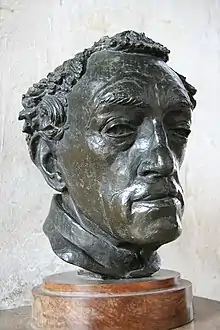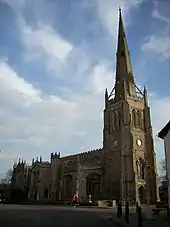Conrad Noel
Conrad le Despenser Roden Noel (12 July 1869 – 22 July 1942) was an English priest of the Church of England. Known as the 'Red Vicar' of Thaxted, he was a prominent Christian socialist.
Conrad Noel | |
|---|---|
 Noel's memorial in Thaxted church | |
| Born | Conrad le Despenser Roden Noel 12 July 1869 |
| Died | 22 July 1942 (aged 73) Thaxted, England |
| Alma mater | Chichester Theological College |
| Spouse |
Miriam Greenwood (m. 1894) |
| Parents |
|
| Religion | Christianity (Anglican) |
| Church | Church of England |
| Ordained |
|
Offices held | Vicar of Thaxted |
Early life
Noel was born on 12 July 1869 in Royal Cottage, Kew Green, London, into an aristocratic family.[1] He was the eldest son of the poet and essayist Roden Noel, who served as Groom of the Privy Chamber, and his wife Alice Maria Caroline Noel (née de Broë).[2] His paternal grandfather was Charles Noel, 1st Earl of Gainsborough, and his paternal grandmother Lady Gainsborough was a lady-in-waiting to Queen Victoria.[2] Noel's parents were both Anglican, though in his youth, Noel repudiated the Calvinism of his mother and attended higher-church services with his father.[3]
He was educated at Wellington College and at Cheltenham College, then also an all-boys public school.[4][5] He then entered Corpus Christi College, Cambridge, but was rusticated (suspended) for a year and chose not to return to complete his degree.[4]
Career
Ecclesiastical career
Noel underwent training for ordination at Chichester Theological College, an Anglo-Catholic theological school.[4] At first he was refused ordination into the Church of England because of his theological views: he had been offered a curacy at All Saints Church in Plymouth, but on the day on which he was scheduled to be ordained, the Bishop of Exeter refused to ordain him.[6]
In 1894, he was ordained deacon in the Diocese of Chester and became a curate in Flowery Field, Cheshire, but left following parishioners' objections to his socialism.[4] He also spent time as a curate at St Philip's in Newcastle, under W. E. Moll.[7] Also in 1894, he married Miriam Greenwood.[4] In late 1904 he became assistant priest to Percy Dearmer at Primrose Hill.
In 1910, he became the vicar of Thaxted, Essex[8] presented by the patron of the living Daisy Greville, Countess of Warwick, who was herself a socialist.[4]
Within Thaxted Parish Church, Noel hung the red flag and the flag of Sinn Féin alongside the flag of Saint George.[9] This led to the "Battle of the Flags" with students from Cambridge leading attacks on the church to remove the flags. Eventually, in 1922 a consistory court ruled against displaying the flags and Noel obeyed the ruling.[10]
He founded the socialist organization Catholic Crusade in 1918,[11] which had some impact in the origins of Trotskyism in Britain.[12]
On Noel's perspective on the Middle Ages, which was similar to that of William Morris and John Ruskin,[13] Reginald Groves wrote:
He himself had drawn much inspiration from the Middle Ages only because he felt that this period, despite many oppressions, had a certain vigour and freedom which expressed itself in communal life; and he borrowed much from the ancient English uses and ceremonials for the worship at Thaxted. But he adapted the ideas and usages to contemporary needs, and he formulated his rediscovery to make of it an outward expression of the newly aroused modern movement for social justice.[14]
Politics
Having become a socialist shortly after finishing his university studies, he joined the Social Democratic Federation.[15] He joined the Independent Labour Party, but in 1911 became a member of the newly formed British Socialist Party.[16]
Noel also supported the British Provisional Committee for the Defence of Leon Trotsky, and signed a letter defending Trotsky's right to asylum and calling for an international inquiry into the Moscow Trials.[17]
Personal life
He was a friend of the composer Gustav Holst who also lived for some years in the town of Thaxted.[15]
He died of cancer on 22 July 1942 aged 73.[18] A sculpture by Gertrude Hermes is in Thaxted church.
Publications
- Ought Christians to be Socialists?, 1909. Transcript of a debate with the Christadelphian Frank Jannaway.
- Socialism in Church History. London: Frank Palmer, 1910.
- The Life of Jesus. London: J. M. Dent & Sons, 1937.
- Jesus the Heretic. London: J. M. Dent & Sons, 1939
References
Footnotes
- Heywood 1996, p. 45; Leech 2004.
- Leech 2004; Poole 2014, p. 60.
- Poole 2014, p. 61.
- Leech 2004.
- "Noel, Conrad (Christian Socialist)". Archives and Special Collections. University of Hull. 1997. Archived from the original on 29 November 2014. Retrieved 25 November 2014.
- Goodfellow 1983, p. 111; Leech 2004.
- Jones 1968, pp. 123–126.
- Poole 2014, pp. 26, 72–73.
- Poole 2014, p. 83.
- Burns 2013, p. 103.
- Poole 2014, p. 70.
- Bloom 2013.
- Heywood 1996, p. 45.
- Groves, Reginald (1967). Conrad Noel and the Thaxted Movement: An Adventure in Christian Socialism. London: Merlin Press. p. 68. Cited in Heywood 1996, p. 45.
- Heywood 1996, p. 44.
- Poole 2014, p. 31.
- Alexander 1991, p. 451.
- Jones 1968, p. 248; Leech 2004.
Works cited
- Alexander, Robert J. (1991). International Trotskyism, 1929–1985: A Documented Analysis of the Movement. Durham, North Carolina: Duke University Press. ISBN 978-0-8223-1066-2.
- Bloom, Clive (2013). Victoria's Madmen: Revolution and Alienation. Basingstoke, England: Palgrave Macmillan. ISBN 978-0-230-31382-8.
- Burns, Arthur (2013). "Beyond the 'Red Vicar': Community and Christian Socialism in Thaxted, Essex, 1910–84". History Workshop Journal. 75 (1): 101–124. doi:10.1093/hwj/dbr073. ISSN 1477-4569. S2CID 162682451.
- Goodfellow, Ian (1983). The Church Socialist League, 1906–1923: Origins, Development and Disintegration (PhD thesis). Durham, England: University of Durham. Retrieved 23 April 2018.
- Heywood, Andrew (1996). "Gustav Holst, William Morris and the Socialist Movement" (PDF). The Journal of the William Morris Society. 11 (4): 39–47. ISSN 0084-0254. Archived from the original (PDF) on 23 April 2018. Retrieved 22 April 2018.
- Jones, Peter d'Alroy (1968). The Christian Socialist Revival, 1877–1914: Religion, Class, and Social Conscience in Late-Victorian England. Princeton, New Jersey: Princeton University Press (published 2016). ISBN 978-1-4008-7697-6. JSTOR j.ctt183pj8c.
- Leech, Kenneth (2004). "Noel, Conrad Le Despenser Roden (1869–1942)". Oxford Dictionary of National Biography (online ed.). Oxford: Oxford University Press. doi:10.1093/ref:odnb/37813.
- Poole, Edward (2014). Troublesome Priests: Christianity and Marxism in the Church of England, 1906–1969 (PDF) (MPhil thesis). Manchester: University of Manchester. Retrieved 22 April 2018.
Further reading
- Chapman, Mark D. (2001). Liturgy, Socialism and Life: The Legacy of Conrad Noel. London: Darton, Longman & Todd. ISBN 978-0-232-52417-8.
- "Conrad Noel and the Catholic Crusade". Anglo-Catholic Socialism. Archived from the original on 17 October 2011. Retrieved 23 April 2018.
- Groves, Reginald (1967). Conrad Noel and the Thaxted Movement: An Adventure in Christian Socialism. London: Merlin Press. OCLC 254097330.
- ——— , ed. (1970). The Catholic Crusade, 1918–1936. London. Archived from the original on 24 April 2018. Retrieved 23 April 2018 – via Anglo-Catholic Socialism.
{{cite book}}: CS1 maint: location missing publisher (link) - Laybourn, Keith (1995). "Noel, Conrad le Despenser Roden (1869–1942)". In Lane, A. Thomas (ed.). Biographical Dictionary of European Labor Leaders. Westport, Connecticut: Greenwood Press. pp. 698–699. ISBN 978-0-313-29900-1.
- Leech, Kenneth, ed. (1993). Conrad Noel and the Catholic Crusade: A Critical Evaluation. Croydon, England: Jubilee Group. ISBN 978-0-905595-11-5.
- Noel, Conrad (1945). Dark, Sidney (ed.). Conrad Noel: An Autobiography. London: J.M. Dent & Sons.
- Pepper, Leonard (1983). Conrad Noel. London: Church Literature Association.
- Putterill, Jack (1962). Conrad Noel: Prophet and Priest, 1869–1942. Saffron Walden, England: Harts Printers.
- Woodifield, Robert (1968). "Conrad Noel". In Reckitt, Maurice B. (ed.). For Christ and the People: Studies of Four Socialist Priests and Prophets of the Church of England between 1870 and 1930. London: SPCK.
